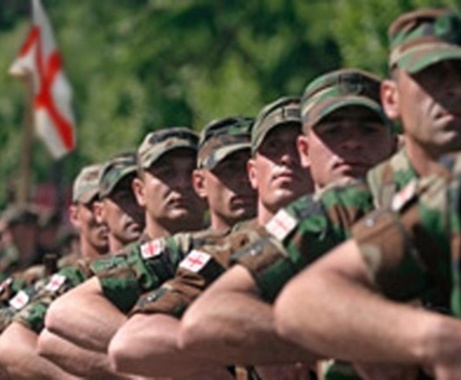
Russian Aggression Prevention Act of 2014: Ramifications for the South Caucasus
Publication: Eurasia Daily Monitor Volume: 11 Issue: 142
By:

With the implementation of new Western sanctions against Russia as a result of the continued instability in eastern Ukraine, the other post-Soviet countries are closely monitoring foreign policy developments inside the United States. The rapidly cooling relations between Washington and Moscow were most recently borne out in the bill proposed by Robert Corker, the ranking Republican on the Senate foreign relations committee (congress.gov, May 1). If it passes into law, Senator Corker’s bill—the “Russian Aggression Prevention Act of 2014”—could precipitate a distinctive, new US approach toward Russia and the wider post-Soviet space.
The bill proposes “Major Non-NATO Ally” (MNNA) status for Georgia, Ukraine and Moldova, and closer interaction by US Armed Forces with these three countries plus Azerbaijan. Specifically, it calls for increasing military exercises and training efforts as well as bolstering security assistance from both the US and the North Atlantic Treaty Organization (NATO).
MNNA status would benefit Georgia, Ukraine and Moldova by providing access to US defense sales and military advantages on a similar level to that currently enjoyed by NATO-member countries. Procedurally and legally, the realization of MNNA status is relatively straightforward in comparison to full membership, which requires a two-thirds Senate majority. But the bill lacks substance in relation to how the US will encourage and help aspirant countries—especially Georgia—with further NATO integration. The law merely requires Washington to “encourage” NATO to create a European Partners Security Fund to support the provision of expanded Alliance trainings, as well as provide assistance for the armed forces of Georgia, Ukraine, Moldova, Azerbaijan and other key non-NATO countries.
Looking to the South Caucasus, the bill excludes Armenia, which is militarily and politically part of the Russian orbit. Georgia and Azerbaijan have different expectations from the United States and the North Atlantic Alliance, and as such have had different reactions to the proposals.
Even before Georgia signed the landmark Association Agreement with the European Union on June 27, Russia had warned the country of negative consequences to such moves (see EDM, May 29). These nebulous threats recently materialized in Moscow’s promise to suspend its free trade agreement with Georgia (Interpressnews.ge, July 30). For the first six months of 2014, the Russian market accounted for only 9.4 percent of total Georgian exports (Civil Georgia, July 31), so the impact of the cancelation will probably not be catastrophic. However, the Kremlin’s approach precludes any further normalization of Tbilisi-Moscow relations, thus pushing Georgia even further toward the West. In this respect, Senator Corker’s bill has been hailed by various Georgian experts as an important development for US-Georgia bilateral relations, comparable to the 2009 Strategic Charter between Washington and Tbilisi (apsny.ge, July 18), because it could streamline bilateral military cooperation (The Messenger, July 18).
However, in two key respects, the bill falls short of Georgian expectations. First, Georgia is keen to make concrete progress on its NATO membership bid, specifically by obtaining a Membership Action Plan (MAP) at NATO’s upcoming Wales Summit (September 4–5). Tbilisi has repeatedly emphasized the importance of this, and expectations have increased as the West’s relations with Russia have deteriorated. Tbilisi expects Washington to encourage NATO-member states to support granting Georgia a MAP, though the “Russian Aggression Prevention Act of 2014” is silent on this issue. Moscow, meanwhile, would perceive a MAP for Georgia as an open provocation, given that a MAP signifies a major step toward full NATO protection.
Second, although Georgian armed forces are largely inter-operable with the North Atlantic Alliance and already reliant on US defense sales, the financing offered by the Corker bill is not major. Moreover, Georgia does not have a large enough defense budget to really benefit from this status. It also bears remembering that when the US last boosted defense cooperation with Georgia in 2009, Moscow and Washington were enjoying a flourishing “reset” period.
In the wake of the Ukraine crisis and over the past month in particular, Azerbaijan has increased its leverage in relation to the US and the EU, due to its importance as an energy supplier. Consequently, Azerbaijan hopes that these changes will improve bilateral relations with the US, building on the “ally” status it earned through its supporting role in the Global War on Terror. However, the current “Russian Aggression Prevention Act of 2014” bill does not meet Baku’s expectations. On the one hand, Azerbaijan expected the removal of Section 907 of the Freedom Support Act, which has banned US government financial aid to Azerbaijan since 1992; as of 2001, the ban has been subject to an annually renewable presidential waiver. Baku also hoped for the repeal of the Jackson-Vanik amendment, which limits bilateral trade.
Thus under these circumstances, the bill has received relatively little media or public attention in Azerbaijan. Instead, the media has pitched the story as “Congress urges [President Barack] Obama to defend Azerbaijan” (novoye-vremya.com, 17 July). Another dimension of this is that Azerbaijan seeks to distance itself from any confrontation with Russia, mainly due to Moscow’s influence on the Karabakh conflict resolution process (ITAR-TASS, August 4). On that issue, Azerbaijan expects more input from the US as another co-chair of the Minsk Group. The Karabakh conflict recently violently flared up again (Vestnik Kavkaza, August 2). Ultimately, for Baku, military and practical assistance from Washington make little sense without first repealing the US laws that place fundamental limits on bilateral relations.
Overall, the “Russian Aggression Prevention Act of 2014” does not offer a clear road map for improving bilateral relations between the US and Azerbaijan, nor between Georgia and NATO. The region is still waiting to see the agenda for the upcoming NATO summit. And all sides are looking to Washington to present a clear plan for how NATO can develop its relations with post-Soviet states—namely the four countries mentioned in the proposed law.




